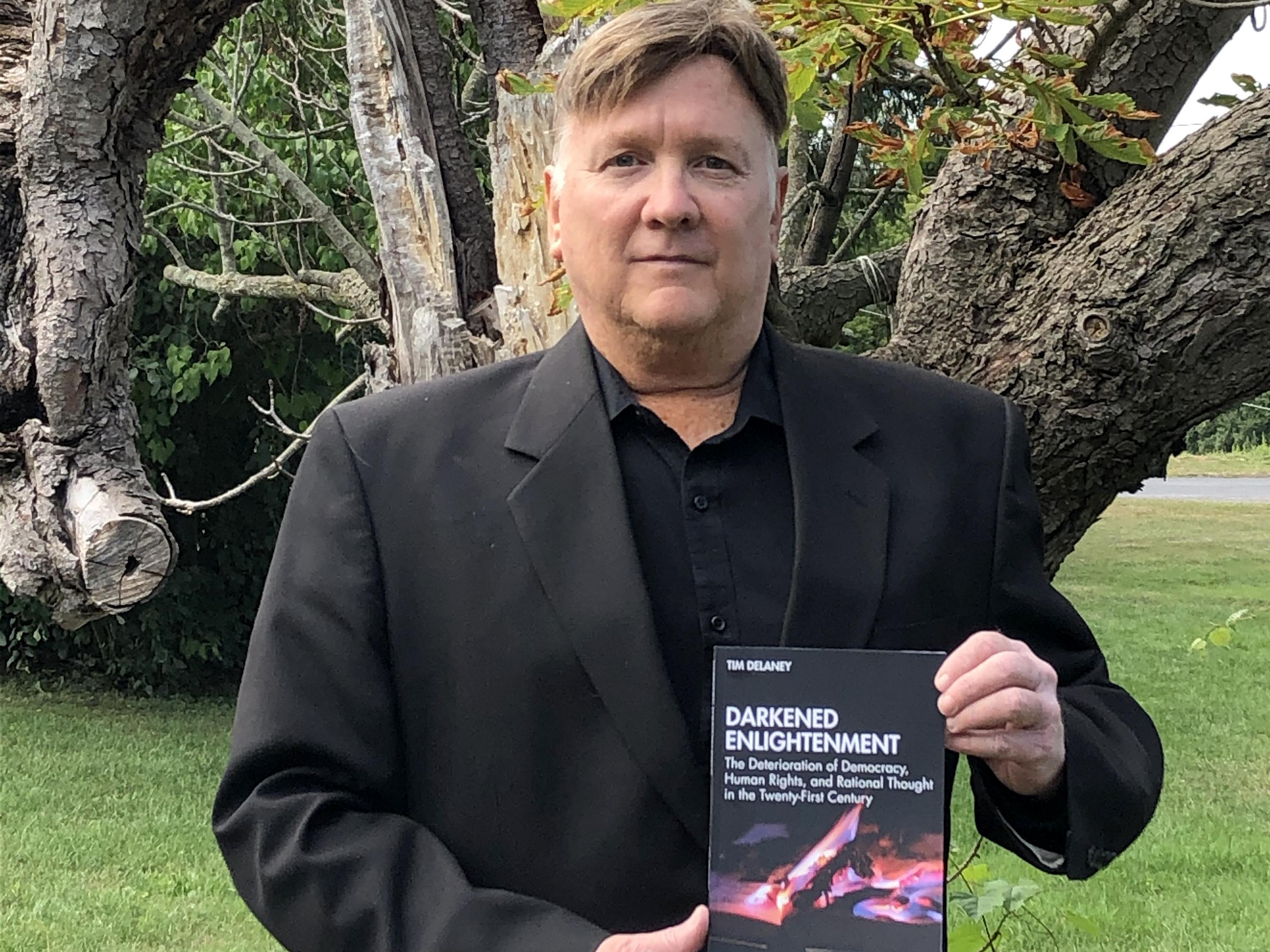PHOTO CAPTION: 'Darkened Enlightenment' -- The latest book by SUNY Oswego sociology professor Tim Delaney, "Darkened Enlightenment," finds the prolific author seeing society at a crossroads, with a choice between rational thought and anti-intellectualism.
“Darkened Enlightenment,” the latest book by SUNY Oswego sociology professor Tim Delaney, finds the prolific author seeing society at a crossroads, with a choice between rational thought and anti-intellectualism.
“‘Darkened Enlightenment’ is a follow-up book to ‘Common Sense: A Paradigm of Thought’ where I argue that there are four primary ways of understanding and structuring the world around us: tradition; faith; enlightened, rational thought; and common sense,” Delaney said. “While ‘Common Sense’ was a book explaining the advantages of utilizing a common sense approach to understanding life and interacting with others, it also revealed the many limitations of relying on such an approach.”
Delaney’s conclusion was that humanity must rely on enlightened and rational thought as the guiding light of governing behavior -- which is more needed now than ever. It is rooted back to the Age of Enlightenment, which encompasses European and early American writing and trends back in the 18th century.
In the successive centuries, science and technology provided an ever-accelerating amount of achievements that benefited humankind on any everyday basis, “including advancements in the medical profession, dramatic improvements in travel, improvements in food production, industrial improvements, advancements in communications and so on,” Delaney said. “We certainly would not have landed humans on the moon without science. Progressive thinking also gave us such notions as human rights and democracy for all.”
Divisions and darkness
But the 21st century has led to divisions in philosophy, sometimes with a feel of overwhelming "darkness" threatening to cast a shadow over all these advancements, Delaney noted.
The sources and symptoms of this darkness include political leaders who rely on lies and mislead their citizens; treat the news media as an enemy; foster populism and nationalism; promote economic disparity; and attack freedom, human rights, science, rationality, higher education and the environment, Delaney said.
“Contemporary society has the advantage of access to all the knowledge accumulated since the Age of Enlightenment, the Age of Reason, the Century of Criticism, mass higher education that teaches critical thinking skills and huge advancements in science and technology,” Delaney explained. “And yet, there is a growing level of ignorance and avoidance of utilizing this knowledge which has resulted in a great darkness encompassing the United States and the rest of the world.”
Delaney’s viewpoint dovetails with an America some might see at a philosophical crossroads in 2020, with very different philosophies leading to ramped-up voter registration and mobilization.
“We will know if there is an earnest chance of moving back toward enlightened, rational and reasoned thinking following the November election,” Delaney said. “My forthcoming third book in this planned trilogy will focus on whether there are significant signs of hope or whether the damage may be insurmountable.”
Published by Routeledge, which specializes in books on the humanities, the book has a potentially wide audience, Delaney noted.
“The audience for this book should be vast, as the topics discussed affect all of us directly and/or indirectly,” Delaney said. “People who promote democracy, human rights and rational thought will love this book; while those who like to live in the darkness of ignorance and misinformation will be afraid of the light of reason offered here.”
The book’s intent is “shining the light on the darkness that surrounds us,” he explained.
“For those already attuned to this darkness I provide further evidence in their battle against the purveyors of falsehoods; those who deny human rights to all people; those who attack the media, science, and higher education; and tyrants and would-be dictators,” Delaney said. “Hopefully, those who have lived in the shadows far too long will read this book and have a woke moment of reality and reason that will provide them with the knowledge to see the darkness that surrounds us all.”




